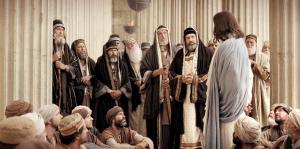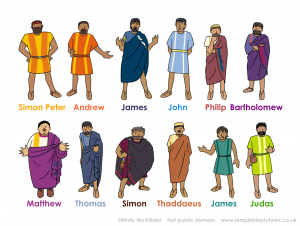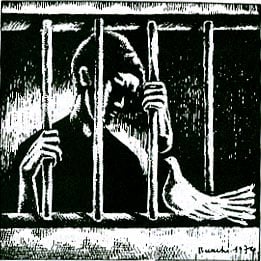
Jesus challenges the three basic elements in the symbolic order that the Pharisees cherished. Perhaps they meant well, but in effect it was an oppressive symbolic order. Seventh in a series on “The Worldly Spirituality of Mark’s Gospel” with help from Ched Myers’ Binding the Strongman: A Political Reading of Mark’s Story of Jesus. The Introduction a Table of Contents are HERE.
Jesus’ ministry of healing and exorcism has led to conflict with the powers that be, the way things just are. Now the attention turns to the Pharisees and their three main concerns.
Pharisees observed a strict regimen and hoped to extend this regimen of salvation to as many people as possible. Their practices and the codes they attempted to enforce had three major concerns—meals, fasting, and the Sabbath. Jesus takes on all three of these.
Pharisees object to Jesus’ “laxity” around Meals
The Pharisaic code imposed all sorts of rules and restrictions on eating. One of these specified the classes of people that the upstanding sort shouldn’t eat with. These included the poor (sinners), foreigners, and those vile cooperators with the Roman occupiers, the tax collectors.
Jesus is walking along and spies Levi at the customs post, collecting a variety of taxes. Jesus says, “Follow me,” and like the others Jesus called, Levi quits his job and follows. Then comes a festive meal at Levi’s house, where “many tax collectors and sinners sat with Jesus and his disciples.” (Mark 2:15) Jesus seems to purposely mix with “sinners,” having established that everyone is equal before God. (See this post, where Jesus repudiates the debt code.) The Pharisees, object. In answer Jesus calls everyone (at least of his followers) sinners. “I did not come to call the righteous but sinners.” (Mark 2:17)
Typically one sees in this saying Jesus’ special concern for sinners, especially repentant ones. I detect something else, a sort of “in your face” attitude by Mark. He’s distinguishing his community from a group that claimed, even sincerely, to be righteous. These Pharisees tried to attract followers by stressing how much better they were than the common folk, the “sinners.” Mark seems to wear the label “sinner” as a badge of honor (or at least an accepted ID). I imagine it’s like the patriots in the U.S. Revolutionary War. They proudly called themselves “Yankees,” a term British soldiers first used in derision.
Jesus’ disciples don’t fast, yet
Another important part of the Pharisees’ identity and distinctiveness was fasting. Mark’s community may have been in competition with the Pharisees and also with a remnant who followed John the Baptist. The next episode contrasts Jesus’ disciples with those two groups. These latter fast, following a regimen considerably beyond what the Law strictly required. Jesus’ disciples don’t.
People came to him [Jesus] and objected, “Why do the disciples of John and the disciples of the Pharisees fast, but your disciples do not fast?” (Mark 2:18)
In answer, Jesus gives his longest teaching yet, full of apocalyptic imagery about an age ending and another beginning. The disciples can’t fast while the Bridegroom is here. But the Bridegroom will be taken away. “On that day” (an apocalyptic phrase) they will fast. Jesus follows with two images that “articulate the traditional apocalyptic dualism of ‘two ages.’” (Myers, p. 159) You don’t sew new cloth on an old cloak, and you don’t pour new wine into old wine skins. Jesus’ young discipleship movement must not conform to the old dominant symbolic order.
Jesus and the Sabbath.
The most important aspect of the Pharisaic program, says Myers, is Sabbath observance. (p. 160) In the next scene shows the Pharisees complaining again. Jesus’ disciples are making a way through a grain field and stripping some plants to eat the grain. It’s the Sabbath and Pharisees consider that a violation of the Sabbath work taboo.
What has always struck me about this incident is how trivial it seems. The disciples were hungry. Obviously they knew the day before that the Sabbath was coming. They could have prepared for it like everybody else and avoided breaking the Sabbath rule. Or on the Sabbath they could have gone hungry like decent Jews.
Myers says that for Jesus it wasn’t just this particular rule. Jesus hated the excessive amount of control that one privileged group in Israel exercised over the rest. In this case it’s in relation to the food economy, the production, the marketing, and the consuming.
Jesus is engaging here in an act of civil disobedience. I’m thinking he may have set his disciples to breaking the law deliberately. It would have been all the more noticeable and irksome to the Pharisees because the issue is so small and the disciples’ act so unnecessary.
Jesus answers the Pharisees by taking a page out of one of their’ favorite books. He appeals to what we call 1 Samuel 21:1-7:
“Have you not heard,” Jesus says, about the time when David and his soldiers were hungry. They had to leave Jerusalem in a hurry and couldn’t get adequate provisions. They came to a “house of God when Abiathar was high priest” and ate the holy bread that only priests were allowed to eat. (Mark 2:23-26)
Jesus isn’t telling the story exactly correctly, and he gets the name of the priest in that house of God wrong. But the point is that he’s making a daring, apparently absurd, comparison. His disciples walking through a grain field are like David’s men in a desperate military campaign. That’s exactly the way Jesus thinks of his whole mission. Jesus is “going on the offensive,” Myers says. (p. 161) He takes on the oppression that he finds everywhere, with decisive, non-violent, political action on the side of the poor.
Jesus concludes with the famous line, “The Sabbath was made for man, not man for the Sabbath. That is why the Son of Man is lord even of the Sabbath.” (2:27-28) This line, like an earlier one, especially the last part, must have been an aside to Mark’s readers rather than part of the event recorded. It’s hard to imagine Jesus claiming to be lord quite yet. It does put the reader on notice that very high stakes are involved in Jesus’ showdown with the authorities. Jesus intentionally transgresses, with the intent of demolishing, the boundaries they have set up between people.












